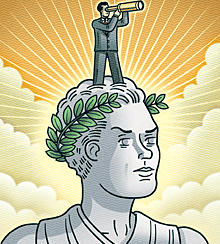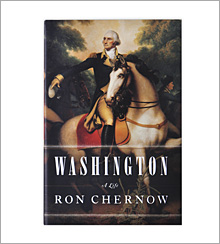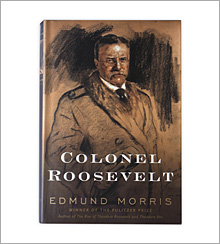Best Business Books 2011: Leadership
Learning to Lead the Old-Fashioned Way
(originally published by Booz & Company)Ron Chernow
Washington: A Life
(Penguin Press, 2010)
Edmund Morris
Colonel Roosevelt
(Random House, 2010)
George W. Bush
Decision Points
(Crown Publishers, 2010)
Once upon a time, long, long ago but not so far away, leadership was learned by learning about leaders. More precisely, we learned to lead by reading about great men (nearly always they were men) and their exploits. As Plutarch’s Lives was the first to attest, the assumption was instruction — life history as a template for what leaders ought and ought not do.
The practice persisted for hundreds, even thousands of years; autobiography and, especially, biography were used as pedagogy. But some 30 or 40 years ago, the age-old tradition nearly came to a grinding halt. Since the burgeoning of the leadership industry with its now countless centers, institutes, programs, courses, seminars, workshops, experiences, teachers, trainers, books, blogs, articles, websites, webinars, videos, conferences, consultants, and coaches, which all claim to teach people how to lead, biography as pedagogy has gone out of fashion. Replaced now by readings on leadership development, training, and education, the life histories of great leaders are decidedly old hat.
The present essay is unapologetically old-fashioned. It’s about the best new books on leadership all right, but it omits from the discourse books explicitly about leadership, in favor of books implicitly about leadership: two biographies and a memoir. Furthermore, although this essay is intended for an audience composed primarily of private-sector leaders, it considers public-sector leaders — three American presidents who left legacies that, whether proud or problematic, endure. In other words, the books under discussion mark a return to leadership learning as a liberal art, a form of instruction as multifaceted and richly textured as it is deeply human.
Collectively, the books follow two trajectories. The first is chronological. The subject of Ron Chernow’s Washington: A Life is the first president of the United States. The subject of Edmund Morris’s Colonel Roosevelt is Theodore Roosevelt, who served as the 26th president, at about the midpoint in American history thus far. And in Decision Points, George W. Bush, the most recent ex-president of the United States, makes himself the book’s subject. The second trajectory is life span. Although Chernow’s book is, as its title implies, about George Washington’s entire life, the biographer is smitten with the start of the story, with Washington before he became president. Bush’s focus is on his time in the White House, on what he perceives to be the key crucibles of his performance as president. Finally, Morris’s book, the third in his magisterial three-volume biography of Theodore Roosevelt, is not only about the illustrious post-presidency of “the Colonel” (as he preferred to be addressed in those years), but also, inevitably, about his decline.
Two of these authors are among the most distinguished of living American biographers: Chernow won the Pulitzer Prize for biography in 2011, for Washington; Morris won it in 1980, for the first volume of the trilogy, The Rise of Theodore Roosevelt. Chernow’s is a doorstop of a book, but, again, he tells the tale in full, from Washington’s birth to his death, and transforms him in the process from bland and boring icon into flesh and blood — a complex, commanding, and charismatic man who willed himself a hero. Morris’s book is almost as thick, but less compelling, not because it is less well written or researched than Chernow’s, but because in focusing on Roosevelt’s post-presidency we are, by definition, deprived of the leader at the height of his powers. Still, the Colonel had one helluva post-presidency, and the book’s value lies in its examination of how a great man winds down, or does not.
Bush’s book is different. First, it is a political memoir, with all the subjectivity that this implies, not an objective biography. Second, it was written (with assistance) by an amateur who is famous for not being particularly literate. Finally, it is by and about a man who well into adulthood took more pride in being a good ol’ boy than he did in being anything else. So, it is no surprise that Decision Points is prosaic in its construction, plain in its prose, and notably lacking in self-reflection. But whatever its defects as a work of literature and critical analysis, Bush’s book does give voice to the man we know: the ordinary Joe, the uber-Texan who, for reasons even he cannot artfully articulate, ended up spending eight years in Washington — as president of the United States.
History and Context
Assuming life stories are valuable sources of instruction, what leadership lessons do these three books provide?
First, history matters. All leaders ought to have some sense of what transpired in the past, of context (both immediate and distal), of who their followers are, and of how the leaders who preceded them played their parts. In reading these three books, I was struck by how Washington and Roosevelt profited from their liberal learning (much of it undertaken of their own volition), and by how Bush was diminished by his relative lack of it, by his lack of information and ideas and, worse, by his lifelong lack of curiosity about people and places other than those with whom and with which he was already familiar.
Second, context matters. In fact, my own model of leadership is in the shape of a triangle with three equal sides: leader, followers, and context. Life stories of leaders are not merely life stories. They are, equally, stories about the times within which leaders lived. It does not belittle Washington to say his greatness was as much a product of his context as it was of anything else. Notwithstanding Chernow’s thoroughly chronicled description of Washington as a man of great derring-do, who by dint of self-construction ascended beyond his own earliest imaginings, and who among his other gifts was an extraordinary physical specimen, this president also had the great good fortune of being born at the right time.
To consider Washington in context is to be reminded of that old chestnut: Great leadership is the result of great fit — between the person and the moment. Although Chernow’s book has justly been praised for infusing its subject with a measure of passion, it is impossible to be indifferent to the multiple upheavals that constituted his subject’s situation. This is not, in other words, a story of only a single struggle — by the Americans against the British — but of several struggles that began in the early 1750s and ended only in the late 1780s. What’s more, because each of these conflicts had military as well as political components, it mattered a great deal that Washington was as brilliantly accomplished a military leader as he was a political one. In fact, his political leadership depended absolutely on the glory he achieved in the military.
Chernow, whose biography of Alexander Hamilton was chosen as an s+b best business book in this category in 2004, does not shy from what leadership theorists call the trait approach: Leaders become leaders because they possess in relative abundance certain traits, or characteristics, that propel them to the fore. George Washington had drive, courage, energy, integrity, and a high level of contextual intelligence. Chernow writes that Washington had, in comparison with his peers, “superior presence, infinitely better judgment, more political cunning, and unmatched gravitas.... He had the perfect temperament for leadership.”
At the same time, however, consider the context in which he lived. For more than a quarter century, Washington played a leading role in each of several different dramas: in the French and Indian War, where he honed his military prowess while acquiring the political and diplomatic skills for which he later became renowned; during the First and Second Continental Congresses, where he nurtured personal and political alignments with members of the colonial elite; during the Revolutionary War, where, as commander in chief of the Continental army, he sealed his fame forevermore; during the Constitutional Convention, over which he famously presided with dignity and restraint; and, finally, as first president of the United States, a position to which he was unanimously elected by the just-established Electoral College.
Lust for Life
The third leadership lesson is that sometimes — not often, but sometimes — a single individual is unstoppable, a force of nature. Even past his prime, Theodore Roosevelt was such a man, a man of such brilliance and vitality, such stunning contradiction, such fierceness in his love of life, that everyone else seemed to shrink in comparison, becoming pygmies in contrast to this giant of a figure. Since Colonel Roosevelt constitutes the final chapter in Theodore Roosevelt’s life, it is more about his ostensible failures than his many successes. The biggest of these failures was his unsuccessful run for president on the ticket of the Progressive or Bull Moose Party, which he had founded for various reasons, not least to reclaim the pinnacle of power. As a result of his combativeness, he also became alienated from leading figures of the day, particularly political opponents, including his two immediate successors as president, William Howard Taft and Woodrow Wilson.
But it’s hard to read this book and dwell on what TR did not accomplish, when he accomplished so much. His lust for life was so great that only death could quell it — first the death, in World War I, of the youngest and brightest of his well-loved children, son Quentin, and then his own, when he was just 60. What stands out most about Roosevelt is his intellectual voraciousness. Most of us know about his hunger for adventure, which took him, famously, to distant continents (Africa and South America) where he, equally famously, and, given his prescient preoccupation with conservation, paradoxically, slaughtered animals in large numbers. What we are less likely to know is that Theodore Roosevelt authored some 40 books, and cultivated an early expertise on a range of subjects, many, but by no means all, related to the natural world. A small example: Morris describes the former president seeking unaccustomed silence and solace at his home on Long Island, and witnessing 42 species of birds — thrashers and herons, bobolinks and catbirds, meadowlarks and red-tailed hawks. “All of them,” Morris writes, “were listed in the catalogue, Notes on Some of the Birds of Oyster Bay, Long Island. He had no need to consult that authoritative work, having written and published it himself, at age twenty.”
Tradition as a Starting Point
The fourth and final lesson is that the ruling class is anything other than dead and gone. In 1921, German sociologist Max Weber published a seminal analysis of three types of leaders, one of which was the traditional leader. Traditional leaders are assumed by their followers to have the right to lead because they are legitimate heirs to legitimate traditions, as, for example, when the prince inherits the throne from his father. It is impossible to read Decision Points, in some ways a modest book by in some ways a modest man, and not conclude that in a million years George W. Bush would never have been elected president had he not been perceived on some level as a legitimate heir to a legitimate tradition.
To be sure, before becoming chief executive, this son of President George Herbert Walker Bush, grandson of Senator Prescott Bush, and, for that matter, brother of Florida Governor Jeb Bush, had twice been elected governor of Texas. But by Bush’s own reckoning, his initial decision to run for governor, even to enter politics, was anything but obvious. Why? Because to understate it, his resume was thin, consisting of little more than brief (nepotistic) political experience, and light (nepotistic) managerial experience. Here is this particular “decision point” — to become a politician — in his own words: “My experiences on Dad’s campaigns and running the Rangers had sharpened my political, management, and communications skills. Marriage and family had broadened my perspective. And Dad was now out of politics. My initial disappointment at his loss gave way to a sense of liberation.... I was free to run on my own.”
Much has been made of George W. Bush’s overweening need to separate from, and prove himself to, George H.W. Bush. As the line “I was free to run on my own” seems to testify, this book does nothing to dispel the impression. Quite the opposite. The reader senses that on September 11, 2001, Bush the younger was further freed, however tragically, to make his own way, however tortured, and establish his own identity, however controversial. Bush himself writes as if his presidential life, his life as a man of consequence, began on that fateful day: “After 9/11, I developed a strategy to protect the country that came to be known as the Bush Doctrine.” It consisted of what he refers to as several “prongs,” of which the fourth and final is what he would have his legacy be. He calls it his “freedom agenda,” which was to “advance liberty and hope as an alternative to the enemy’s ideology of repression and fear.” For a man who begins his memoir with the story of his quitting drinking — he writes of being prodded by his wife, Laura, who asked in a “calm, soothing voice” if he could remember the last day he didn’t have a drink — Bush came far, albeit with a mighty, mandatory assist from his fabled family.
I divide the leadership industry into two parts. One concerns learning about leadership, or leadership as an area of intellectual inquiry. And the other concerns learning how to lead, or leadership as a skill we should aspire to acquire. Life histories satisfy on both counts: They educate and elucidate, and they provide exemplars. Ron Chernow’s Washington: A Life is my candidate for the best book on leadership this year. But it is much more than that. It is an evergreen instruction on American history, a painterly portrait of a great man, and, to boot, a first-rate read.![]()
Author profile:
- Barbara Kellerman is the James MacGregor Burns Lecturer in Public Leadership at Harvard University’s John F. Kennedy School of Government. She is the author and editor of many books, including Followership: How Followers Are Creating Change and Changing Leaders (Harvard Business School Press, 2008) and The End of Leadership, which will be published in 2012 by HarperCollins.




